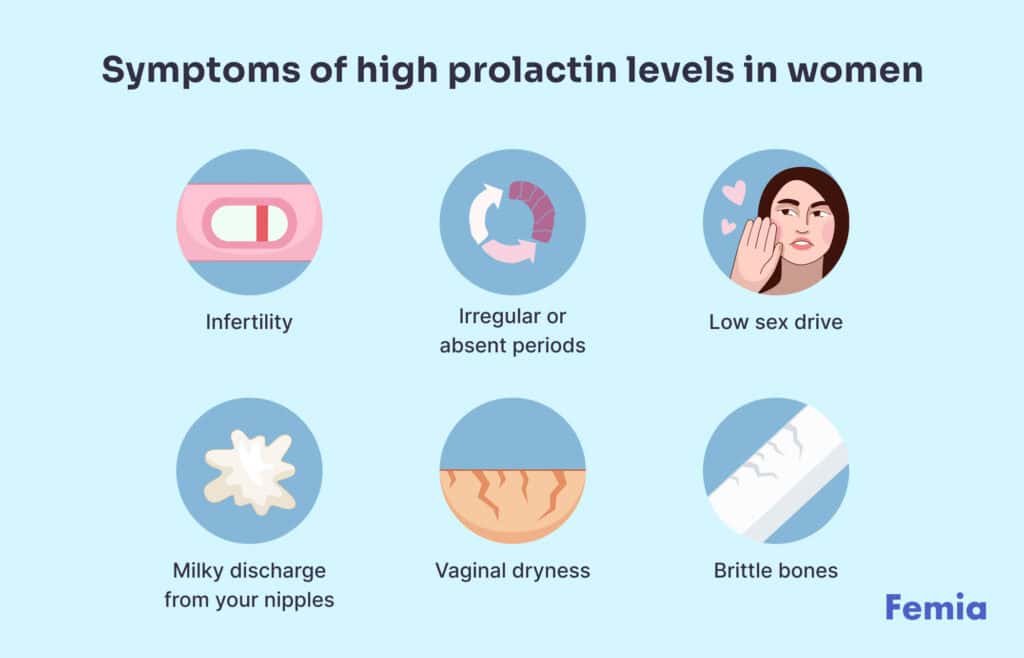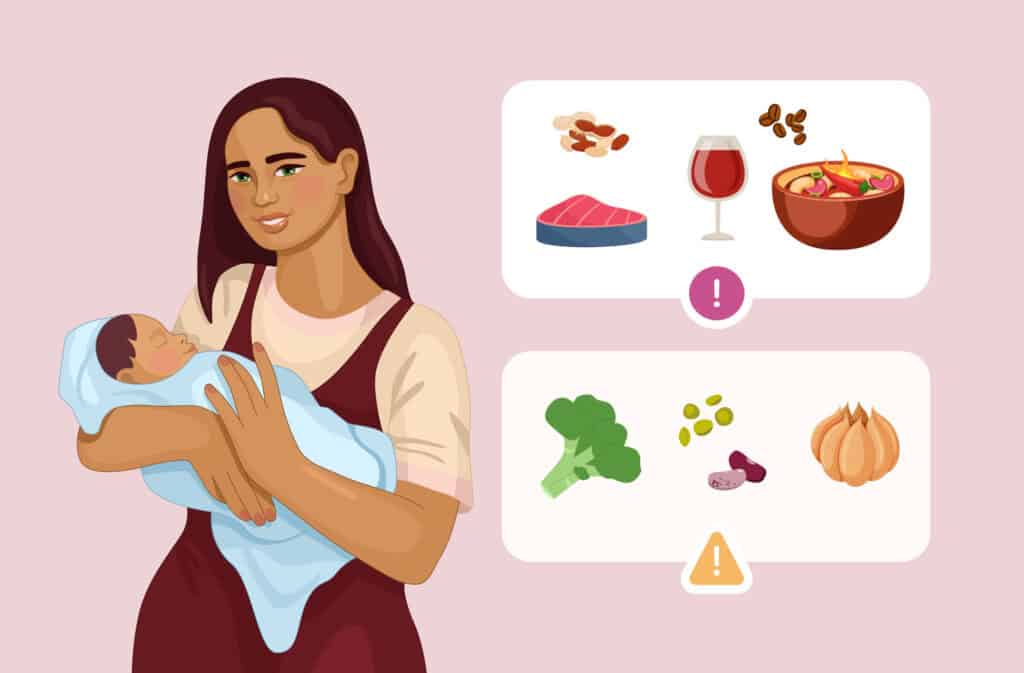Femia > Health Library > Getting Pregnant > Planning pregnancy > Hyperprolactinemia: How to lower prolactin to increase fertility
Hyperprolactinemia: How to lower prolactin to increase fertility

- Updated Feb 11, 2025
- Published
CRAFTED BY HUMAN
Crafted by human At Femia, we provide accurate and up-to-date information at every stage of your journey, from trying to conceive, pregnancy and postnatal support. All content is created by a real person based on in-depth research and own professional experience. Femia ensures that you will receive expert advice, strict accuracy and a personalized approach from our authors/medical experts. Learn more about our editorial policy.
FACT CHECKED
Fact checked At Femia Health, we maintain the highest standards of editorial excellence in delivering content focused on helping you conceive, guiding you through pregnancy, and supporting you postpartum. Explore our content review principles to learn how we ensure the accuracy and quality of our health and lifestyle tips for every stage of your journey.
- High prolactin levels can cause irregular periods, infertility, and milky nipple discharge.
- Medications, lifestyle factors, and benign pituitary gland tumors are common causes of hyperprolactinemia.
- Early diagnosis and treatment using a combination of natural lifestyle methods and medications can lower prolactin levels and restore ovulation, increasing your chances of getting pregnant.
Prolactin is a hormone secreted by the pituitary gland. It’s primarily associated with milk production and lactation but is also related to overall reproductive health and fertility.
Pregnant women and breastfeeding mothers will naturally have high prolactin but women who are not pregnant or breastfeeding, and men, should have low prolactin levels. If you have unexpectedly high levels of prolactin this is called ‘hyperprolactinemia’.
In this article, we will help you to understand what prolactin is and why it matters. You will also learn about the commonest causes of hyperprolactinemia and how you can lower your prolactin levels, both naturally and medically.
Femia helps millions of women understand and balance their hormones
What is prolactin and why is it important?
Prolactin’s main role is to signal breast tissue growth during pregnancy and milk production for breastfeeding after birth. High prolactin levels, also called ‘hyperprolactinemia’ occur when the pituitary gland makes and secretes too much prolactin.
Your pituitary gland is a small gland found at the base of your brain, it’s responsible for producing several important hormones including: prolactin, luteinizing hormone (LH), follicle-stimulating hormone (FSH) and thyroid-stimulating hormone (TSH).
The production of prolactin is controlled by two hormones, dopamine and estrogen. Dopamine inhibits the production of prolactin while estrogen increases it. Your prolactin levels can be impacted by pregnancy, medications, health conditions, and lifestyle factors like stress and diet.
Here are some factors that can cause high prolactin levels in women:
- Certain medications
- Thyroid disorder
- Chest wall injuries or infections
- Liver and kidney disease
- Pituitary gland tumors
- Hormone imbalance after pregnancy
How does high prolactin affect fertility?
Your menstrual cycle is controlled by several essential reproductive hormones and an imbalance in any of them can disrupt your cycle and reduce fertility.
Elevated prolactin levels can cause a hormonal imbalance that disrupts ovulation and impacts fertility. Raised prolactin levels suppress the secretion of the gonadotropin-releasing hormone (GnRH). GnRH stimulates the production of the reproductive hormones FSH and LH which are essential for the development and release of an egg from the ovaries during the menstrual cycle. Hyperprolactinemia can lower reproductive hormone levels, creating a hormonal imbalance that prevents the ovaries from releasing an egg (anovulation). Without ovulation, pregnancy cannot occur.
To restore ovulation, prolactin levels need to be lowered back to normal levels so the reproductive hormones can return to normal.
What level of prolactin causes infertility?
Raised prolactin levels is one of the causes of female infertility. Here’s a brief guide to prolactin levels.
Normal prolactin levels:
- Non-pregnant or non-breastfeeding women: <25 ng/ml
- Pregnant women: 80 – 400 ng/ml
Prolactin levels that are higher than normal can result in symptoms of hyperprolactinemia including disrupted ovulation and reduced fertility. Very high levels of prolactin (>150 ng/ml) usually signal that the cause of hyperprolactinemia is an underlying prolactinoma (pituitary gland tumor).
👉Find out more: Why am I not getting pregnant? Understanding common reasons for conception challenges
Symptoms of high prolactin in females

Some women with mild hyperprolactinemia may have very mild symptoms or no symptoms at all. Symptoms of high prolactin levels in women include:
- Infertility
- Irregular or absent periods
- Low sex drive (low libido)
- Milky discharge from your nipples (galactorrhea)
- Vaginal dryness
- Brittle bones (osteoporosis)
If the cause of hyperprolactinemia is a prolactinoma you can also experience:
- Headaches
- Visual problems
- Weight loss
- Fatigue
Causes of elevated prolactin levels (hyperprolactinemia)
Various factors can cause elevated prolactin levels, with some causing a persistent increase while others lead to a temporary rise.
Common causes of hyperprolactinemia:
- Lifestyle factors: emotional or physical stress, poor sleep, sex, exercise, nipple stimulation, diet, or breast stimulation can all temporarily increase prolactin levels.
- Medications: Common medications like birth control pills, some antidepressants, estrogen therapy, and medications to treat nausea and vomiting and reflux can cause hyperprolactinemia.
- Polycystic ovary syndrome (PCOS): PCOS can cause raised prolactin in some women.
- Thyroid disorders: Underactive thyroid (hypothyroidism) can cause high prolactin.
- Prolactinoma: This benign (non-cancerous) tumor of the pituitary gland is one of the most common causes of hyperprolactinemia.
- Other tumors: Other tumors or diseases affecting the pituitary or hypothalamus can disrupt prolactin levels.
- Liver and Kidney disease: Certain diseases of the liver and kidneys like chronic liver disease can result in raised prolactin levels.
- Chest wall trauma: Trauma to the chest like fractured ribs or irritation from infections like shingles on the chest can cause hyperprolactinemia.
While finding the cause of hyperprolactinemia can help to guide management, in up to 40% of cases no specific cause can be found, this is called ‘idiopathic’ hyperprolactinemia.
Femia helps millions of women understand and balance their hormones
How to lower prolactin levels naturally
If your prolactin levels are higher than normal and you’re looking for natural ways to help balance your hormones then here are some useful prolactin-lowering strategies to try:
- Reduce stress: The body’s response to stress is complex and can affect your health in many ways. Chronic stress can elevate prolactin levels but incorporating relaxation techniques like yoga, meditation, or mindfulness into your daily routine can help reduce stress levels and hormonal imbalance.
- Balanced diet: Your diet can influence your prolactin levels. A small 1995 study published in the American Journal of Clinical Nutrition found that diets high in saturated fats can raise prolactin levels. However, certain nutrients can naturally lower prolactin levels including:
- Zinc: Zinc reduces the amount of prolactin produced so having a zinc deficiency can cause hyperprolactinemia. Making sure your diet consists of plenty of Zinc (found in nuts, seeds, and whole grains) can help keep prolactin levels in balance.
- Vitamin B6 inhibits the production of prolactin so diets high in vitamin b6 can reduce prolactin levels. Vitamin B6 is found in bananas, spinach, and poultry.
- Herbal remedies and supplements: Before starting any herbal remedy or supplement it’s important to consult your healthcare provider to make sure it’s the right fit for you. Chasteberry (Vitex agnus-castus), a herbal medicine traditionally used to support female reproductive health, can help balance hormones and is known to inhibit prolactin production.
- Prioritize sleep: Poor sleep can disrupt hormones including prolactin levels. Prioritizing sleep and making sure you get at least 7 hours of sleep a night can help to keep your reproductive hormones in balance.
👉Find out more: Unexplained infertility: Causes, treatments, and how to move forward
Medical treatments to lower prolactin
Depending on your prolactin levels, symptoms, and the underlying cause of hyperprolactinemia, your healthcare professional may suggest medical treatments to lower your prolactin levels. Common treatment options include:
- Medications: Dopamine agonists like cabergoline and bromocriptine are medications that are used to treat high prolactin levels. They work by stopping your pituitary gland from producing prolactin.
- Surgery: For most people with hyperprolactinemia caused by a prolactinoma, medications can reduce the size of the tumor and lower prolactin levels. However, if medications are ineffective or cause too many side—effects then surgery might be recommended.
- Radiation: Very rarely radiation might be required if surgery and medications have not been effective.
Consulting your healthcare provider for an accurate diagnosis is essential. Since elevated prolactin levels can have multiple causes, treatment will depend on the underlying cause, severity, and your overall health.
How to lower prolactin levels to get pregnant naturally
To naturally lower prolactin levels and improve fertility, consider combining natural methods like lifestyle adjustments with medical treatments advised by your healthcare professional.
Focus on managing stress, a nutritious diet high in zinc and vitamin B6, and ensuring you get enough sleep to help naturally lower prolactin levels. Herbal remedies may also help but it’s important to consult your healthcare professional first before starting any.
Depending on your prolactin levels, your overall health, and the underlying cause of hyperprolactinemia, your healthcare provider might suggest medical treatment. Dopamine agonists like cabergoline and bromocriptine are common medications used to reduce prolactin levels and support ovulation.
If you’re ovulating, then recognizing the signs of high fertility can help increase your chances of getting pregnant naturally. Tracking your ovulation using ovulation kits or with an app like Femia can help you monitor your cycle and identify when you will ovulate. This can help you to identify your fertile window and detect any unusual patterns, prompting you to seek guidance from a healthcare professional when appropriate.
When to see a doctor
If you’re experiencing any symptoms of raised prolactin levels, have persistently irregular periods, or have concerns about infertility, then reach out to your healthcare provider. They’ll be able to take a personalized approach and recommend any further tests that you might need like blood tests or imaging.
Having a definitive diagnosis of hyperprolactinemia and identifying a cause will help guide your management plan.
Questions from the Femia community
Can stress alone cause high prolactin levels?
Yes, chronic stress can increase prolactin production by reducing dopamine levels. Dopamine inhibits the production of prolactin and chronic stress can reduce dopamine activity resulting in raised prolactin levels.
How long does it take for prolactin levels to normalize with treatment?
The severity of hyperprolactinemia and the underlying cause can influence how quickly prolactin levels take to return to normal after starting treatment. Still, in general, levels should start to lower within a few days to weeks. Although it might take a few months before you notice significant improvement.
Does high prolactin always require medication?
No, if the underlying cause is found and can be managed with lifestyle changes then medication might not be necessary. However, your healthcare provider will be able to guide your treatment and monitor your prolactin levels.
Can high prolactin affect libido in women?
Yes, it can lower sex drive by disrupting hormonal balance. High prolactin levels can disrupt the production of estrogen levels and lead to a lower sex drive, vaginal dryness and discomfort having sex.
The bottom line
High prolactin levels can cause menstrual cycle disturbances, infertility, low sex drive, and affect your overall health. Early diagnosis and treatment of raised prolactin levels are crucial for restoring hormonal balance and optimizing your fertility.
Using a combination of lifestyle changes like diet and stress reduction alongside any medical treatments recommended by your healthcare professional can effectively lower prolactin levels and restore reproductive health.
If you have irregular menstrual cycles, are struggling to get pregnant or have any other symptoms of hyperprolactinemia then reach out to your healthcare provider. They will be able to arrange any necessary tests and guide any treatment needed.
References
- Baghurst, Pa, et al. “Diet, Prolactin, and Breast Cancer.” American Journal of Clinical Nutrition, vol. 56, no. 5, Nov. 1992, pp. 943–49. https://doi.org/10.1093/ajcn/56.5.943.
- “Hyperprolactinemia.” Cleveland Clinic, 24 Dec. 2024, my.clevelandclinic.org/health/diseases/22284-hyperprolactinemia.
- Levine, Samara, and Ozgul Muneyyirci-Delale. “Stress-Induced Hyperprolactinemia: Pathophysiology and Clinical Approach.” Obstetrics and Gynecology International, vol. 2018, Dec. 2018, pp. 1–6. https://doi.org/10.1155/2018/9253083.
- Maizes, Victoria. “Preconception Counseling and Fertility.” Elsevier eBooks, 2017, pp. 518-525.e2. https://doi.org/10.1016/b978-0-323-35868-2.00051-7.
- Majumdar, Abha, and NishaSharma Mangal. “Hyperprolactinemia.” Journal of Human Reproductive Sciences, vol. 6, no. 3, Jan. 2013, p. 168. https://doi.org/10.4103/0974-1208.121400.
- Professional, Cleveland Clinic Medical. “Gonadotropin-Releasing Hormone (GnRH).” Cleveland Clinic, 17 Sept. 2024, my.clevelandclinic.org/health/body/22525-gonadotropin-releasing-hormone.
- “Pituitary Gland.” Cleveland Clinic, 19 Dec. 2024, my.clevelandclinic.org/health/body/21459-pituitary-gland.
- Prolactin. www.sciencedirect.com/topics/medicine-and-dentistry/prolactin.
- ucsfhealth.org, 31 Oct. 2023, www.ucsfhealth.org/medical-tests/prolactin-blood-test#:~:text=Men%3A%20less%20than%2020%20ng,80%20to%20400%20%C2%B5g%2FL).
- Prolactinoma | Brain Institute | OHSU. www.ohsu.edu/brain-institute/prolactinoma.
- Society, Endocrine. “Hyperprolactinemia.” Endocrine Society, 31 Mar. 2022, www.endocrine.org/patient-engagement/endocrine-library/hyperprolactinemia#:~:text=Production%20of%20prolactin%20is%20controlled,prolactin%2C%20while%20estrogen%20increases%20it.
- Website, Nhs. “Causes.” nhs.uk, 13 Oct. 2022, www.nhs.uk/conditions/polycystic-ovary-syndrome-pcos/causes.
- Witwit, Suha J. “The Role of Vitamin B6 in Reducing Serum Prolactin in Comparison to Cabergoline.” International Journal of Pharmaceutical Quality Assurance, vol. 10, no. 01, May 2019, https://doi.org/10.25258/ijpqa.10.1.17.

Look out for these danger signs of pregnancy during your second trimester which require immediate medical attention.

Your nutrition while lactating can upset your baby and impact your milk supply. Here is what not to eat while breastfeeding and what foods to incorporate into your diet.

Many women drink raspberry leaf tea during pregnancy to prepare for labor. Find out how raspberry leaf tea can benefit you and when to start raspberry leaf tea.

